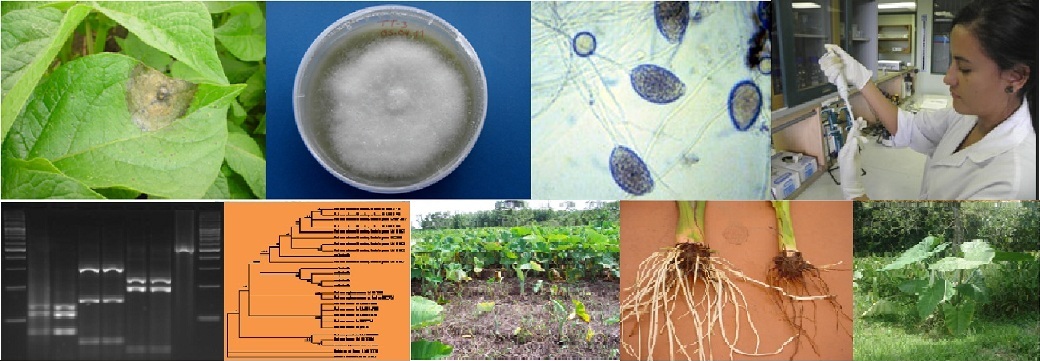Plant Biotechnology

Laboratory
The Plant Biotechnology Laboratory (LBP in spanish) of the Agronomic Research Center began its work at the end of the 1970s. The initial objective was the production of healthy seed from roots and tubers and clonal multiplication of the pejibaye through the tissue culture technique. The transfer of technology together with the production of elite seed in these crops promoted their rapid growth and the diversification of their work. Currently the laboratory develops its work in different fields: the micropropagation of plants, the molecular characterization of varieties, the production of healthy seeds of various crops of agricultural and commercial importance in Costa Rica and genetic improvement; mainly from potatoes and roots and tubers using conventional and biotechnological techniques.
1. Plant´s micropropagation
The LBP has protocols for the micropropagation and acclimatization of tiquizque, ñampí, yam, yampí, cassava, plantain, banana, blackberry, raspberry, potato, ginger, sweet potato, pejibaye, blueberries, strawberry, papaya, taro and multiple medicinal plants. . and ornamentals (psychotria, echinacea, mint, petunias, ferns, chinaberries, asters, gerberas...).

2. Virus-free plants production
The elimination of viruses from tropical species through the cultivation of meristems represents one of the most important areas of work of the LBP. This technique is based on the fact that viruses are not present in meristematic cells, so the in vitro culture of meristems leads to the elimination of a significant number of viruses. In the LBP, virus-free plants are produced from crops such as tiquizque, ñampi, potato, yam, yucca and yampí and ornamental plants.

3. Prebasic and basic production of roots and tubers seeds.
The use of seed of high genetic quality, free of pests and diseases, is essential to have high yields. In recent years, the LBP has coordinated the production of pre-basic and basic seed for potatoes, tiquizque, yams, yampí, cassava and ginger. The objective of this work area is to make seeds with high genetic potential, free of pests and diseases, available to producers, promoting health and better yields in these crops.
4. Phytopathological studies
The LBP develops phytopathological studies in different crops, aimed at characterizing the population of the most important diseases of these crops under the agroclimatological conditions of Costa Rica. In potatoes, research work is carried out to characterize the population of the fungus Phytophthora infestans, which causes “tizón tardío”. In addition, studies of the sensitivity of this fungus to fungicides and the evaluation of resistance to this disease, present in potato materials from sexual crossings and protoplast fusion, are carried out. In the case of tiquizque, studies are being carried out to characterize the pathogens associated with “mal seca” and the selection of promising materials to search for genetic resistance to this disease.

5. DNA analysis (molecular markers)
The LBP also uses DNA analysis (genetic material) for the varietal characterization of plants and phytopathogenic microorganisms through the use of molecular markers.
6. Plant breeding through biotechnological techniques
The LBP carries out genetic improvement in various crops (potato and tropical roots and tubers) through conventional tools (crossing and mutagenesis) and biotechnological tools (protoplast fusion). The variability present in wild species is used in improvement programs. In potatoes, the aim is to obtain varieties resistant to the main pests and diseases of the crop in the country; while the tiquizque varieties resistant to “mal seco”.

7. Technology transference
One of the main objectives of the LBP is to bring the results of its research to producers. This objective is achieved through: training courses, workshops, talks, field days, development of production guides, consulting, release of promising materials, production and distribution of seed free of pests and diseases.
8. Services
The LBP offers services in the development of protocols for the micropropagation of food and ornamental crops, production of virus-free plants from roots and tubers, varietal characterization, technical advice in the design and establishment of laboratories, training in biotechnological techniques (tissue cultures, molecular analyzes for pathogen characterization and varietal characterization) and agronomic management of potatoes and tropical roots and tubers.
Researchers
Dr. Arturo Brenes, Coordinador, arturo.brenes@ucr.ac.cr Dr. Francisco Saborío, francisco.saborio@ucr.ac.cr Dr. Luis Gómez, luis.gomezalpizar@ucr.ac.cr
Plant Biotechnology Laboratory, Agronomic Research Center
Universidad de Costa Rica Tel: (506) 2511-3046, Fax: (506) 2234-1627
